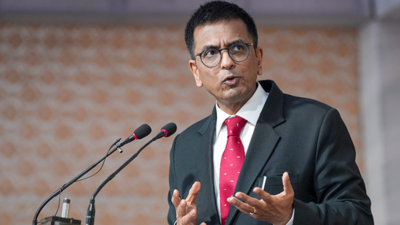CJI DY Chandrachud (File photo)
NEW DELHI:: As if responding to the oft-thrown jibe at judges – “tyranny of the unelected and unaccountable” –
CJI D Y Chandrachud
said judges, though neither elected nor accountable directly to the people like the political executive, are bound by the
constitutional mandate
to ensure
equitable distribution
of resources and protection of individuals’ rights.
The “tyranny of the unelected and unaccountable” jibe was repeatedly thrown at SC when it quashed the irregular allocations of 2G spectrum and coal blocks by UPA govt, and also when it struck down the NJAC enacted by NDA govt.
Delivering the Jigme Singye Wangchuk lecture at Thimphu in Bhutan on Thursday, the CJI said the essence of the
public trust
doctrine is that parliamentarians, judges, and govts hold constitutional authority only as representatives and trustees of the people.
He said while the political executive, directly elected by the people, is the sole authority to decide how natural resources and other tangible and intangible resources are distributed among the people, it is the
judiciary
which is vested with the responsibility to ensure that the distribution is equitable and not as per the whims and fancies of certain individuals.
“We are not elected representatives. Public trust applies to us differently from other wings of govt,” the CJI said, adding that judges are peculiarly placed in the doctrine of public trust linked with accountability as accountability is typically associated with elected representatives in democratic theory.
Unlike the case of elected representatives, people do not have a role to play in the appointment of judges or influencing their decisions, he said. “Populist decision-making sits rather uncomfortably on the sinewy shoulders of
judicial independence
. Yet the courts do require public trust and legitimacy.”
“Public trust is central to the credibility of the judicial branch, which is otherwise insulated from public opinion in its operations – as it must be. Yet our insulation, which is intrinsic to our independence, provides a crucial need and justification for ensuring public trust in our functioning,” he said.
